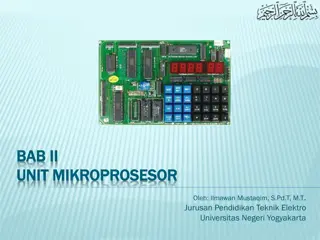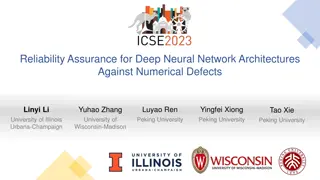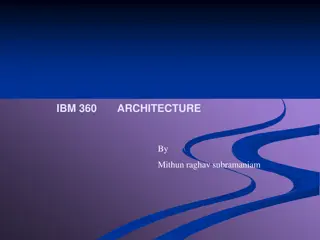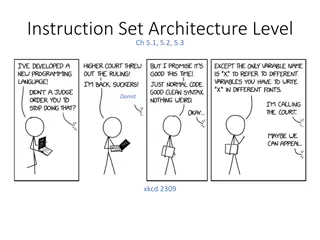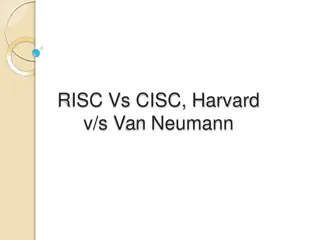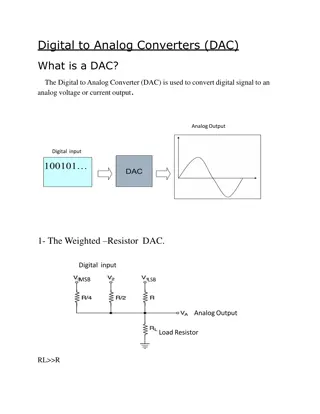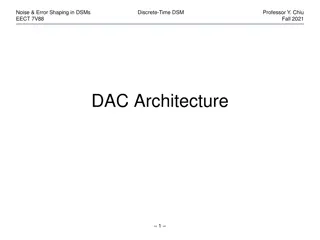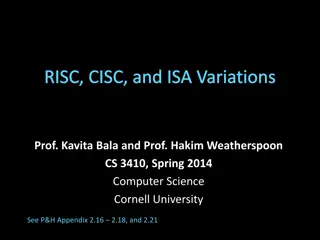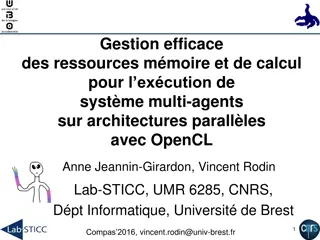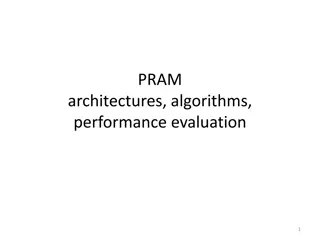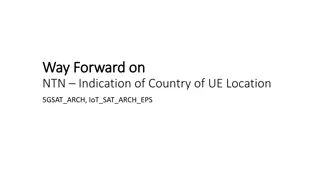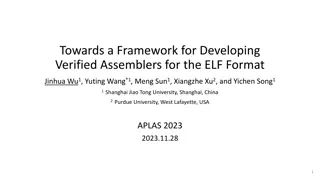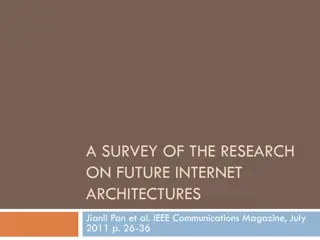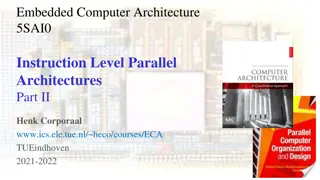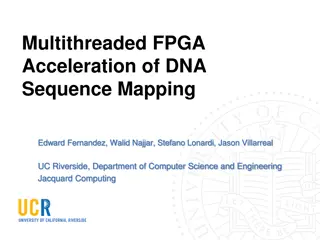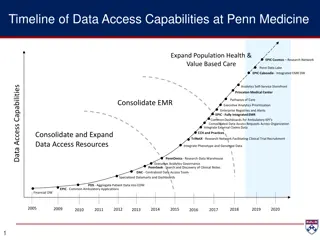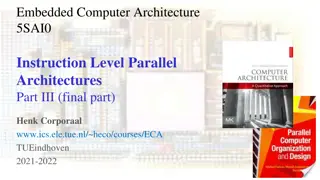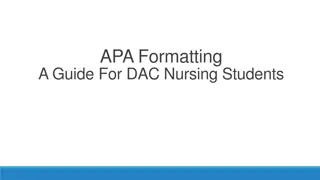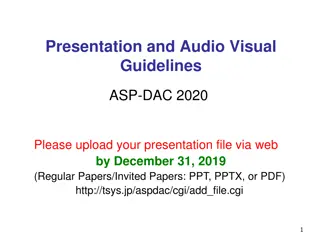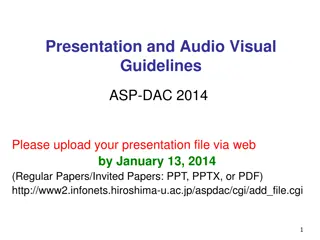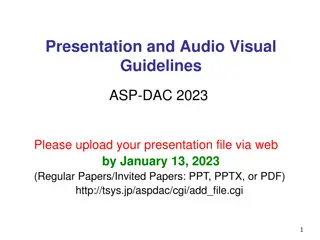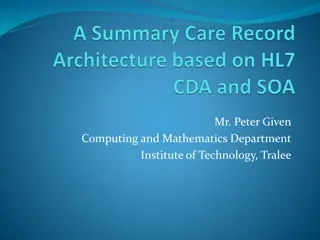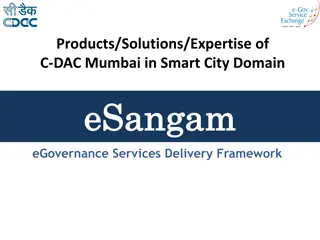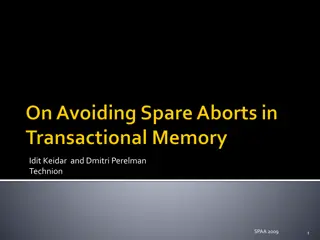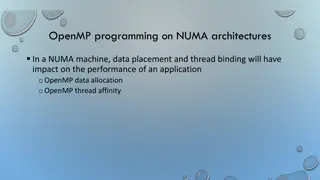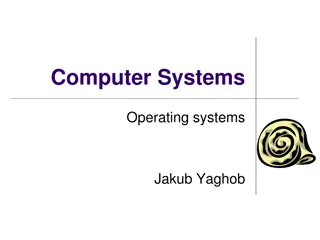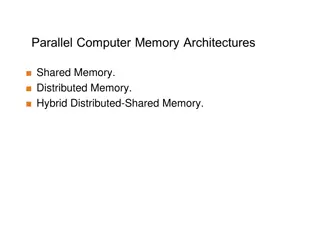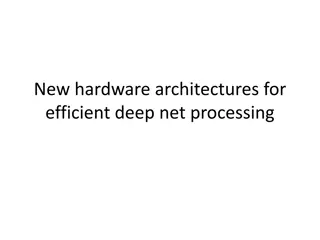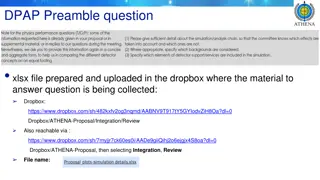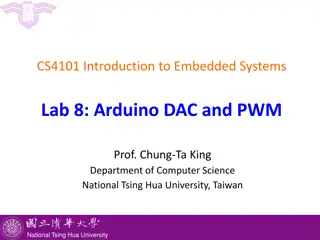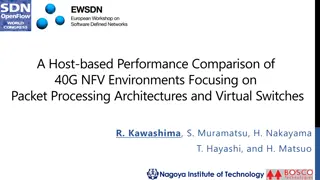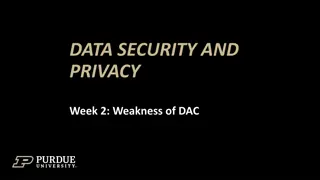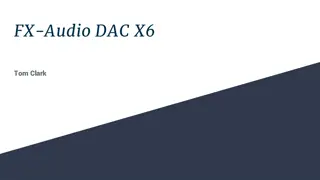Overview of California's Carbon Removal Initiatives
California's Carbon Removal Innovation Support Program (CRISP) aims to incentivize Direct Air Capture (DAC) development in the state. The program includes research test centers, small-scale demonstrations of DAC technologies, community engagement, technical assistance, and more to enhance carbon rem
1 views • 5 slides
Understanding Microprocessor Architecture and Software Design
Microprocessor architecture and software design play crucial roles in the development of microprocessors. This article explores the internal features, software design types, and characteristics of Complex Instruction Set Computer (CISC) and Reduce Instruction Set Computer (RISC) architectures. It de
8 views • 73 slides
Ensuring Reliability of Deep Neural Network Architectures
This study focuses on assuring the reliability of deep neural network architectures against numerical defects, highlighting the importance of addressing issues that lead to unreliable outputs such as NaN or inf. The research emphasizes the widespread and disastrous consequences of numerical defects
0 views • 26 slides
Evolution of IBM System/360 Architecture and Instruction Set Architectures
The IBM System/360 (S/360) mainframe computer system family, introduced in 1964, revolutionized computing by offering forward and backward compatibility, a unified instruction set architecture (ISA), and a balance between scientific and business efficiency. The critical elements of this architecture
2 views • 18 slides
Understanding Shared Memory Architectures and Cache Coherence
Shared memory architectures involve multiple CPUs sharing one memory with a global address space, with challenges like the cache coherence problem. This summary delves into UMA and NUMA architectures, addressing issues like memory latency and bandwidth, as well as the bus-based UMA and NUMA shared m
0 views • 27 slides
Exploring Logical Agents and Architectures in Wumpus World
Explore the use of logical agents in the Wumpus World domain through three agent architectures: reflex agents, model-based agents, and goal-based agents. Understand how these agents operate in the challenging environment of the Wumpus World, where the task is to find the gold, return to starting pos
0 views • 21 slides
Understanding Instruction Set Architecture and Data Types in Computer Systems
In computer architecture, the Instruction Set Architecture (ISA) level is crucial in defining how a processor executes instructions. This includes the formal defining documents, memory models, registers, and various data types that can be supported. The ISA level specifies the capabilities of a proc
2 views • 13 slides
Contrasting RISC and CISC Architectures
Contrasting RISC (Reduced Instruction Set Computing) and CISC (Complex Instruction Set Computing) architectures, the images and descriptions elaborate on their advantages and disadvantages, with a focus on multiplying two numbers in memory using a CISC approach. CISC processors aim to complete tasks
0 views • 35 slides
Understanding Digital to Analog Converters (DAC) and Their Applications
Digital to Analog Converters (DAC) are essential components used to convert digital signals into analog voltage or current outputs. This article explains the working principle of DACs, provides examples of different types such as Weighted Resistor DAC, R-2R Ladder DAC, Feedback Amplifier DAC, and Si
0 views • 9 slides
Understanding Shared Memory Architectures and Cache Coherence
Shared memory architectures involve multiple CPUs accessing a common memory, leading to challenges like the cache coherence problem. This article delves into different types of shared memory architectures, such as UMA and NUMA, and explores the cache coherence issue and protocols. It also highlights
2 views • 27 slides
Noise & Error Shaping in Discrete-Time DSMs EECT 7V88 - Fall 2021
Explore the intricacies of noise and error shaping in DSMs with Professor Y. Chiu's course on Discrete-Time DSMs for EECT 7V88 in Fall 2021. Delve into DAC architectures including Nyquist, binary-weighted, and more. Learn about Binary-Weighted CR DAC, CP Cu, capacitor arrays, gain errors, nonlineari
1 views • 30 slides
Variations in Computer Architectures: RISC, CISC, and ISA Explained
Delve into the realm of computer architectures with a detailed exploration of Reduced Instruction Set Computing (RISC), Complex Instruction Set Computing (CISC), and Instruction Set Architecture (ISA) variations explained by Prof. Kavita Bala and Prof. Hakim Weatherspoon at Cornell University. Explo
0 views • 55 slides
Efficient Resource Management for Multi-Agent System Execution on Parallel Architectures with OpenCL
This research focuses on efficiently managing memory and computing resources for executing multi-agent systems on parallel architectures using OpenCL. The study presents a hybrid approach involving population-level molecular virtual chemistry and individual-level virtual cells. The work enhances a p
1 views • 33 slides
Introduction to PRAM Architectures and Algorithms
This content covers Parallel Random Access Machine (PRAM) architectures, algorithms, and performance evaluation. It discusses shared memory models, PRAM processors, network models, and provides definitions related to parallel computation. Insight from experts Joseph F. JaJa and Uzi Vishkin is includ
0 views • 27 slides
NTN Indication and UE Location in 5G and IoT Architectures
Background information on the inclusion of indication of country of UE location in network messages for PLMN selection in 5G and IoT architectures. Discussions on the necessity, impact, and decisions regarding this indication, along with ongoing proposals and requirements. Consideration of factors s
0 views • 5 slides
Framework for Developing Verified Assemblers for ELF Format
This research paper discusses the importance of verified assemblers in the context of verified compilation, focusing on the development of verified assemblers for the ELF format for multiple architectures like X86, RISC-V, and ARM. The framework aims to be configurable, extensible, and general to su
0 views • 32 slides
Research Insights on Future Internet Architectures
This survey explores key research topics in designing future internet architectures, focusing on innovations, content/data-oriented paradigms, mobility challenges, cloud-computing architectures, security considerations, and experimental testbeds. The study emphasizes the need for collaborative proje
0 views • 43 slides
Exploring Instruction Level Parallel Architectures in Embedded Computer Architecture
Delve into the intricacies of Instruction Level Parallel Architectures, including topics such as Out-Of-Order execution, Hardware speculation, Branch prediction, and more. Understand the concept of Speculation in Hardware-based execution and the role of Reorder Buffer in managing instruction results
0 views • 51 slides
FPGA Acceleration of DNA Sequence Mapping using Multithreaded Architectures
Introduction to the use of FPGA for hardware acceleration of multithreaded architectures targeting DNA sequence mapping, implementation of FHAST tool, FM-Index string matching algorithm, and evaluation of results.
0 views • 20 slides
Evolution of Data Access Capabilities at Penn Medicine
Penn Medicine has expanded its data access capabilities over the years through various initiatives like EPIC Cosmos Research Network, Penn Data Lake, DAC, and more. The Data Analytics/Access Center (DAC) plays a crucial role in managing enterprise resources, data architecture, development, reporting
0 views • 23 slides
Advanced ORC Architectures for Waste Heat Recovery at IIT Madras
Presentation of a novel Trans-critical Regenerative Series Two-Stage Organic Rankine Cycle (TR-STORC) by researchers Anandu Surendran and Satyanarayanan Seshadri at the 5th International Seminar on ORC Power Systems in Athens. The TR-STORC layout combines supercritical evaporation in the high-pressu
0 views • 21 slides
Embedded Computer Architecture - Instruction Level Parallel Architectures Overview
This material provides an in-depth look into Instruction Level Parallel (ILP) architectures, covering topics such as hazards, out-of-order execution, branch prediction, and multiple issue architectures. It compares Single-Issue RISC with Superscalar and VLIW architectures, discussing their differenc
0 views • 49 slides
APA Formatting: A Comprehensive Guide for DAC Nursing Students
This guide provides detailed instructions on APA formatting rules for nursing students at DAC. It covers general formatting rules, title page components, body of paper structure, and referencing rules. From setting page margins to organizing content with headings, this guide ensures proper complianc
0 views • 16 slides
Guidelines for Uploading Presentations and Slide Preparation at ASP-DAC 2020
Learn how to upload your presentation files for ASP-DAC 2020 by following the specified guidelines. Ensure your presentation and slides meet the required formats and layout recommendations for an effective display. Enhance your presentation skills by focusing on content delivery and slide preparatio
0 views • 11 slides
Presentation and Visual Guidelines for ASP-DAC 2014
Guidelines for preparing and uploading presentations for ASP-DAC 2014, including file format requirements, time limits, slide preparation rules, and archive options. Speakers are advised on creating effective slides, ensuring readability, and promoting their ideas to a larger audience via the confer
0 views • 11 slides
Issues Before the Defense Advisory Committee on Sexual Assault in the Armed Forces (DAC-IPAD)
Explore the origin, charter, methodology, and mission of DAC-IPAD, established under the FY 2015 NDAA to provide independent advice on sexual misconduct cases in the military. Learn about the diverse membership, selection processes, sources of information, and key reports issued by the committee.
0 views • 18 slides
Effective Presentation and Audio-Visual Guidelines for ASP-DAC 2023
Guidelines for creating and uploading presentation files for ASP-DAC 2023, including instructions on file formats, slide preparation, and archiving. Tips provided for slide layout, font usage, and visual simplicity to enhance audience engagement and comprehension.
0 views • 10 slides
Guidelines for Uploading Presentation Files at ASP-DAC 2019
Ensure your presentation file meets the guidelines set by ASP-DAC 2019 by uploading it via the provided link before January 15, 2019. Presentation files must be in either PowerPoint 97-2003 (.ppt), PowerPoint 2007-2016 (.pptx), or PDF formats. You can also choose to make your slides available on the
0 views • 11 slides
Enhancing Healthcare Data Sharing with Service-Oriented Architectures
This paper explores how Service-Oriented Architectures (SOA) can be integrated with the HL7 Clinical Document Architecture to facilitate the sharing of Summary Care Records between healthcare information systems. It highlights the benefits of a federated architecture based on SOA and coding standard
0 views • 51 slides
C-DAC Mumbai eSangam: Empowering Smart City Governance
C-DAC Mumbai's eSangam initiative aims to streamline government services delivery through an integrated framework, promoting cooperation among departments and offering secure messaging channels. Features include open standards support, disaster recovery solutions, and centralized connector hosting f
0 views • 9 slides
Analysis of Transactional Memory Techniques in Multi-Core Architectures
Emerging multi-core architectures have led to the adoption of Transactional Memory (TM) as a new synchronization method. This study delves into the challenges of TM, examining the consequences of transaction aborts, the need for spare aborts, and evaluating measures to enhance transaction processing
0 views • 23 slides
Understanding OpenMP Programming on NUMA Architectures
In NUMA architectures, data placement and thread binding significantly impact application performance. OpenMP plays a crucial role in managing thread creation/termination and variable sharing in parallel regions. Programmers must consider NUMA architecture when optimizing for performance. This invol
0 views • 18 slides
Understanding Computer Systems and Operating System Architectures
An exploration of computer systems and operating system architectures, covering topics such as CPU modes, monolithic and layered architectures, microkernel architecture, Linux and Windows kernel architectures, as well as devices and their terminology. The content delves into the roles, structures, a
0 views • 57 slides
Understanding Shared Memory, Distributed Memory, and Hybrid Distributed-Shared Memory
Shared memory systems allow multiple processors to access the same memory resources, with changes made by one processor visible to all others. This concept is categorized into Uniform Memory Access (UMA) and Non-Uniform Memory Access (NUMA) architectures. UMA provides equal access times to memory, w
0 views • 22 slides
Exploring Efficient Hardware Architectures for Deep Neural Network Processing
Discover new hardware architectures designed for efficient deep neural network processing, including SCNN accelerators for compressed-sparse Convolutional Neural Networks. Learn about convolution operations, memory size versus access energy, dataflow decisions for reuse, and Planar Tiled-Input Stati
0 views • 23 slides
Status of DAC Questions and Progress Update on ATHENA Proposal
The provided Dropbox links contain files and information related to the DPAP Preamble question, status of answers to DAC questions, and updates on the ATHENA Proposal integration and review process. The document highlights the current progress, pending actions, and areas needing attention for resolu
0 views • 6 slides
Introduction to Arduino DAC and PWM in Embedded Systems Lab
Explore the practical application of Arduino's digital-to-analog converter (DAC) and pulse width modulation (PWM) techniques through projects involving RGB LED modules, analog joysticks, and stepper motors. Learn to control RGB LED colors, read analog joystick input values, and operate stepper motor
0 views • 10 slides
Performance Comparison of 40G NFV Environments
This study compares the performance of 40G NFV environments focusing on packet processing architectures and virtual switches. It explores host architectures, NFV related work, evaluation of combinations of PM and VM architectures with different vswitches, and the impact of packet processing architec
0 views • 24 slides
Understanding Weaknesses of Discretionary Access Control (DAC) in Data Security
Explore the vulnerabilities of DAC in data security through a detailed examination of the Morris Worm incident as a case study. Learn about the implicit trust in program integrity, sandboxing approaches, and the need to align access control policies with program behavior.
0 views • 65 slides
FX-Audio DAC X6 Overview and Teardown Analysis
FX-Audio DAC X6 is a digital-to-analog converter with a built-in amplifier designed for higher impedance headphones like the Drop K7XX. The device features multiple inputs including Optical, USB, and Digital Coax, with outputs to line-out RCA ports and headphones. A breakdown of the internal compone
0 views • 4 slides

